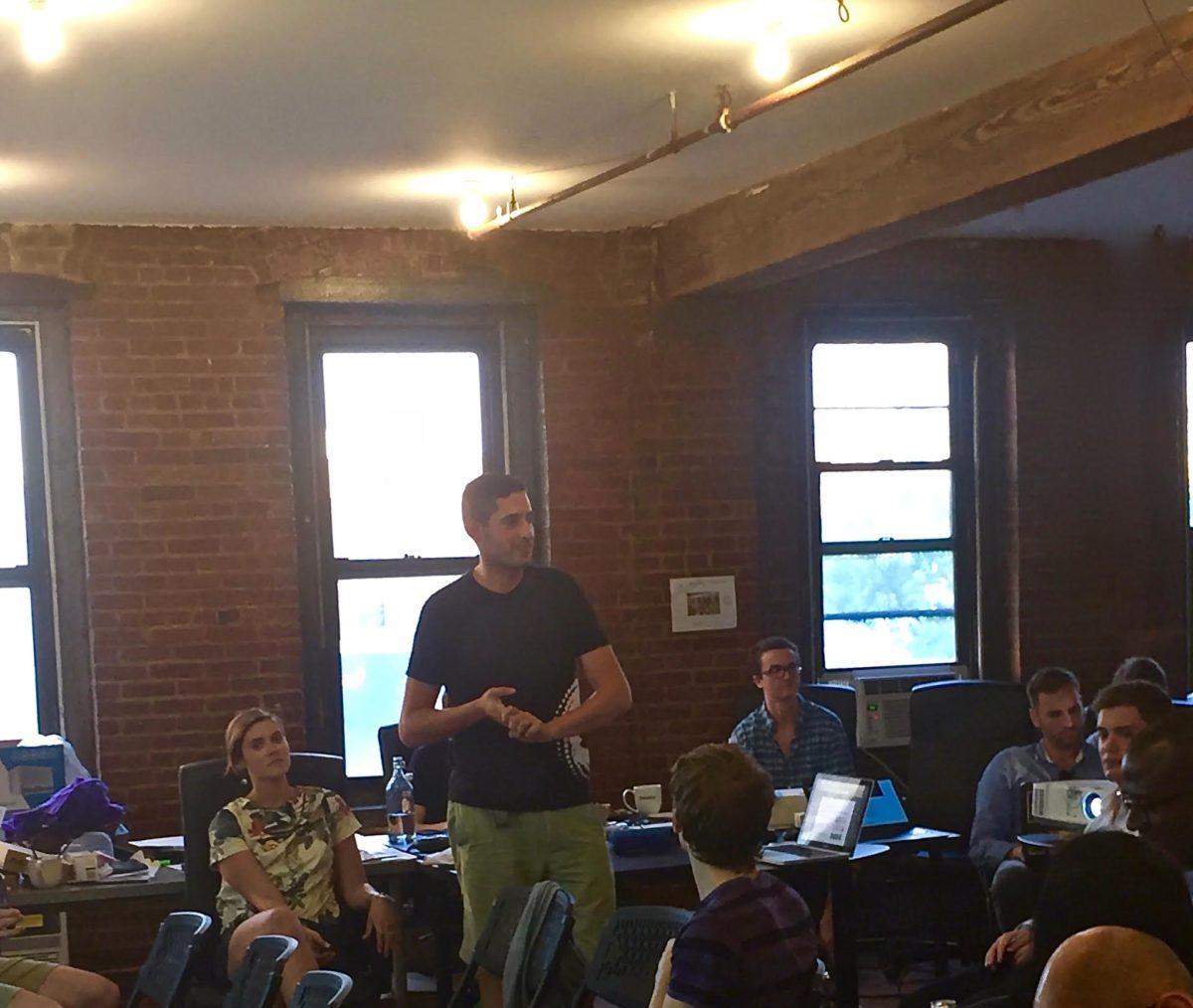These days, there’s a big elephant in the room for anyone who’s interested in blockchain platform Ethereum.
Two weeks ago, the Decentralized Autonomous Organization fund, or DAO, was hacked, resulting in some $50 million worth of ether being stolen. So where does the Ethereum community go from here?
That was the first topic up for discussion at yesterday’s open house held by Ethereum experts ConsenSys at its Bushwick offices. The event, which attracted a full house of blockchain enthusiasts, included demos of the company’s latest projects and networking. But founder and CEO Joseph Lubin kicked things off by addressing the security breach, calling it “potentially a systemic threat.”
“If we don’t clean this up, there will be months, potentially years of this distraction,” he said. “It’s really sapping the productive energy from the platform.”
That said, the DAO breach hasn’t halted ConsenSys’ day to day work. The bulk of ConsenSys’ revenue comes from its corporate customers, for which it develops private applications. So they have been sheltered from the recent attack. Among those clients, Lubin said, “there’s not much concern.”
https://twitter.com/mark_dago/status/748284904329338884
The Ethereum community is well on its way to resolving the breach, Lubin said, with a “hard fork,” a software update that would freeze the fund.
ConsenSys at Work
Demonstrating just how hard at work they’ve been, ConsenSys employees showed some of their recent projects to the audience. Igor Lilic, the company’s principal technical lead, demoed a proof-of-identity application, in which a physical letter is used to validate a user’s address and then is associated with the blockchain.
Lilic’s the application started out as a side project. As such, he admitted, it’s not meant to be an ironclad form of identity verification, but more of a proof of concept. It’s important, he said, to build a “web of trust around identity” on the blockchain to get more people to adopt it.
“We can never fully get rid of trust,” he said. “The DAO showed us that.”
Product lead Ryan Gittleson walked the audience through a demo of Virtue Poker, an online poker application that uses the Ethereum blockchain to hold funds. (The actual game isn’t run on the blockchain; instead, each player uses an encryption key to ensure that no cheating takes place.)
The online poker industry, as Gittleson explained, has been beset by corruption and fraud in the past decade. As a result, regulations vary widely from country to country (Sweden, for example, only allows state operators to run games), or even state to state in the U.S. A blockchain-based operation, Gittleson suggested, could restore trust to the industry.
Though he didn’t give a demo, project manager Jesse Grushack was also on hand to talk about Ujo, a music application in development that would enable better management of artist royalties. Right now, the process of paying musicians is quite complex, in large part because different organizations manage copyrights for specific aspects of music production. ConsenSys recently joined the Open Music Initiative launched by the Berklee College of Music, which aims to simplify how musicians are paid.
“I’ve heard a bunch of stories of $40, $50, $100 checks sitting around, because the labels don’t know who they’re supposed to go to,” Grushack said.

Inside ConsenSys’s open house. (Photo by April Joyner)
The Company’s Future
Beyond ConsenSys’ current projects, Lubin and Lilic identified some bold goals for increasing adoption of Ethereum and blockchain applications among the average Internet user. Lilic’s proof-of-identity application could be a starting point for a universal ID, independent of any state, in which others could endorse one’s identity.
Such an application, Lubin added, could help bring the billions of people who lack an official ID or bank account into the formal economy. A blockchain-based ID could also help internet users maintain greater control over their personal information and allow them, potentially, to selectively disclose details to companies in exchange for payment.
“It’s a little early, but that’s part of our Holy Grail,” Lilic said.
As for ConsenSys itself, Lubin aims for it to become a familiar name among consumers. Although it started out as a studio, and much of its work has involved building custom applications for enterprise clients, Lubin said that the bulk of ConsenSys’s work will be focused on the average internet user. Though he doesn’t plan to raise funding for the company now, in the future, he said, he may consider holding a crowdsale of shares in a portion of the company. Lubin said he is confident that Ethereum-based applications will become mainstream, though it will likely take five to ten years to get there.
“It will be roughly a World Wide Web timeline,” he said. “That’s how long it took for the internet to filter down to the average person.”
Before you go...
Please consider supporting Technical.ly to keep our independent journalism strong. Unlike most business-focused media outlets, we don’t have a paywall. Instead, we count on your personal and organizational support.
3 ways to support our work:- Contribute to the Journalism Fund. Charitable giving ensures our information remains free and accessible for residents to discover workforce programs and entrepreneurship pathways. This includes philanthropic grants and individual tax-deductible donations from readers like you.
- Use our Preferred Partners. Our directory of vetted providers offers high-quality recommendations for services our readers need, and each referral supports our journalism.
- Use our services. If you need entrepreneurs and tech leaders to buy your services, are seeking technologists to hire or want more professionals to know about your ecosystem, Technical.ly has the biggest and most engaged audience in the mid-Atlantic. We help companies tell their stories and answer big questions to meet and serve our community.
Join our growing Slack community
Join 5,000 tech professionals and entrepreneurs in our community Slack today!

